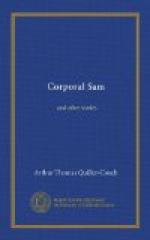My answer to this was that, even allowing it, we must wait for the sound of fighting at Respryn Bridge, farther up the vale, or at one of the two fords a little below it. For there, and there only, could our men cross the river, as they must to hit off any line of escape through Liscard and into Devon. The bridge we knew to be held by a guard, and almost to a certainty the fords, though swollen by recent rains, would be watched also. It was a part of the plan to surprise and force these crossings, and no question but that—unless their guard had been strengthened—they could be forced. But as certainly the guard, however weak, would make at least some show of fight; so certainly, indeed, that the sound of firing here was to announce success and be our signal to rejoin the main body.
Now from this bridge of Respryn a highway climbs from the valley and runs due east across the downs; that is to say, straight athwart the track we were holding; and our orders were on no account to cross this highway, but to halt at some little distance on the near side of it, place ourselves in cover, and so await the signal. For the enemy held it—we could spy a couple of their camp-fires on the rise where it crosses Five Barrow Hill, with a third somewhat nearer, by the cross lanes called Grey Mare—and it would assuredly be patrolled. If in attempting to cross it we fell foul of the patrol, the alarm might draw their troops down towards the bridge; and again, if we crossed it without mishap, we should be no better placed and might easily overshoot our mark, for somewhere alongside this road our general would direct his retreat, over the heather and short turf that stretched for miles ahead and for a mile or more on either hand—fair open country and for cavalry the best in the world.
Accordingly we found cover in a belt of fir-trees overlooking the valley, and for a while possessed our souls in patience. We were early, having come without mishap or challenge, and to expect a like speed of two thousand five hundred men—riding in thick fog through water-meadows, with ditches to be crossed and gates to be found and passed—was in the last degree unreasonable. Nevertheless, dawn could not be far off, and as the minutes dragged by, my spirits sank and my thoughts ran on a score of possible disasters.
By-and-by the sky began to pale. We heard a small troop of horsemen coming down the road at a walk—a patrol perhaps, or perhaps they were riding down to relieve the guard by the bridge. We listened and made out their number to be twenty or thereabouts. The wind had shifted—another good reason for keeping on our side of the road—and blew from them to us; but our horses were well trained. The troop drew level with our hiding; we could hear the jingling of their bits, and with that came our signal. A couple of pistol shots rang out; they made every man of us start in his saddle, and they were followed by a volley.




